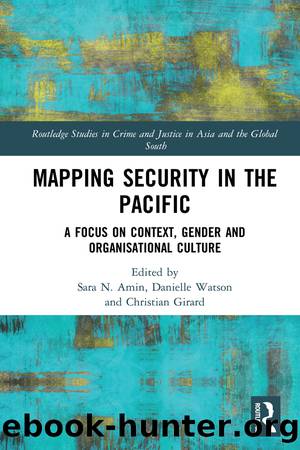Mapping Security in the Pacific by Sara N Amin Danielle Watson Christian Girard

Author:Sara N Amin, Danielle Watson, Christian Girard [Sara N Amin, Danielle Watson, Christian Girard]
Language: eng
Format: epub
Tags: Nonfiction, Social & Cultural Studies, Social Science, Crimes & Criminals, Criminology, Gender Studies
ISBN: 9780429626654
Publisher: Taylor and Francis
Published: 2020-02-25T05:00:00+00:00
Womenâs limited power in decision making
As in most countries of the South Pacific, social and political organisation in Fiji is dominated by institutionalised patriarchal structures (Ravuvu, 1983). Power-based, hierarchical gender relations continue to curtail gender equality at many levels of decision making. From the national political level to the community and to the household level, women are often excluded and have less freedom to participate in decision making and leadership than men (ADB, 2016; Chattier, 2015). The community and family are among the most important social institutions within the Fijian culture and both are socially organised along traditional patriarchal norms (Chattier, 2012; Harrington, 2004). Women have traditionally little say in neither village meetings nor other community decision-making processes. Patriarchal decision making is also common practice within households, although women often have the best chance to have an influence on decisions at this level (Harrington, 2004).
Rapid modernisation and urbanisation slowly pave the way to a pervasiveness of modern Western ways of life into the traditional social fabric, which slowly contributes to a softening of traditional lifestyles (Naidu, 2003, 2006). Nonetheless, the culturally-normed division of gender roles and duties have been quite static, particularly in traditional social settings like villages (Becker, 1995; Charan, Kaur, & Singh, 2016). Womenâs customary roles are closely linked to reproductive and domestic duties, such as bearing and raising children, preparing meals and taking care of elders. This position constrains their public presence and impedes access to information. Traditional social perceptions of womenâs subordination are widespread in society. Women are expected to oblige to the decisions of men (Bolabola, 1986), which curtails womenâs rights to self-determination.
The unequal power distribution in terms of governance at community and household levels contribute to a large extent to the marginalisation of women in climate change adaptation and disaster risk reduction decision making as well (Charan et al., 2016). As such, womenâs vulnerability to climate change and hazards depends to a large extent on good decision making of men in the process of defining, planning and implementing community and household-based adaptation and coping activities and projects. As economic empowerment and the rights of women to act on their own behalf are constrained, womenâs human insecurity and vulnerability can increase.
Download
This site does not store any files on its server. We only index and link to content provided by other sites. Please contact the content providers to delete copyright contents if any and email us, we'll remove relevant links or contents immediately.
The Radium Girls by Kate Moore(10959)
The Templars by Dan Jones(4218)
100 Deadly Skills by Clint Emerson(4122)
Rise and Kill First by Ronen Bergman(4059)
The Doomsday Machine by Daniel Ellsberg(3768)
The Rape of Nanking by Iris Chang(3564)
Killing England by Bill O'Reilly(3486)
Hitler in Los Angeles by Steven J. Ross(3470)
Stalin by Stephen Kotkin(3116)
12 Strong by Doug Stanton(3077)
Hitler's Monsters by Eric Kurlander(2760)
Darkest Hour by Anthony McCarten(2671)
Blood and Sand by Alex Von Tunzelmann(2630)
The Art of War Visualized by Jessica Hagy(2442)
Hitler's Flying Saucers: A Guide to German Flying Discs of the Second World War by Stevens Henry(2320)
The Code Book by Simon Singh(2246)
The Second World Wars by Victor Davis Hanson(2149)
Babylon's Ark by Lawrence Anthony(2092)
Tobruk by Peter Fitzsimons(2079)
